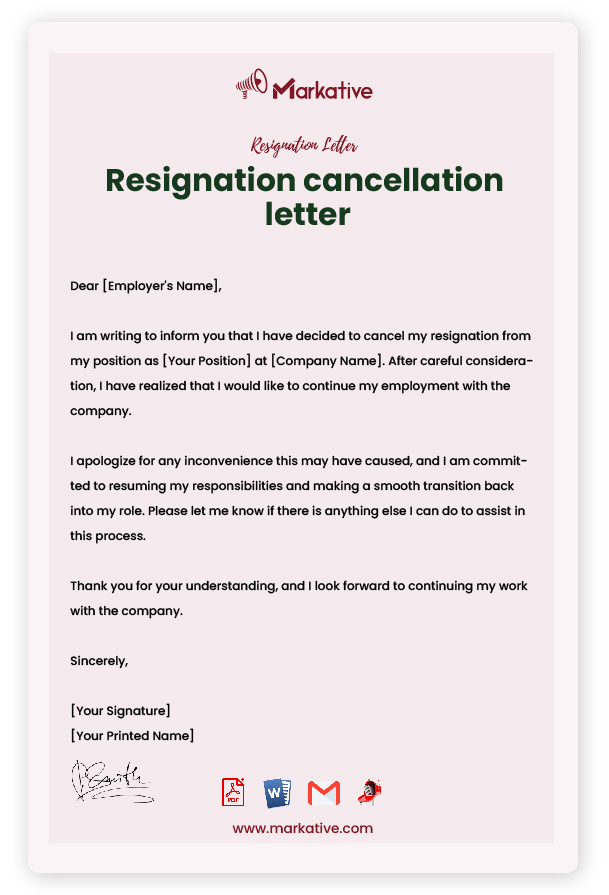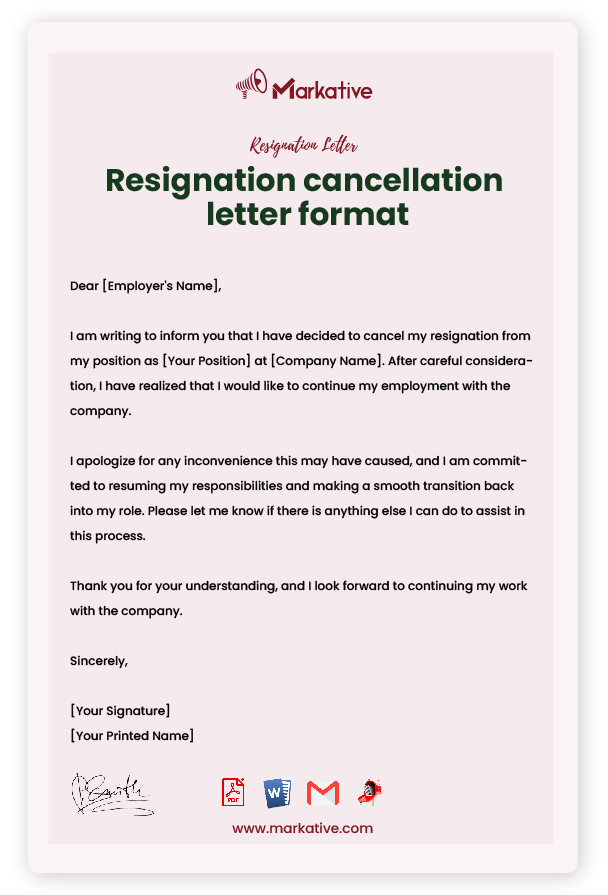Resignation is a crucial step in the career path of every individual. It marks the end of one chapter and opens up opportunities for new beginnings. It is a decision that requires careful consideration and planning. Once an employee decides to resign, it is essential to communicate this decision to the employer in a professional manner. Writing a resignation letter is an effective way to ensure that the employer is aware of the employee’s decision to resign.
A good resignation letter can create a lasting impact on the employer and colleagues. It is an opportunity to leave a positive impression and maintain professional relationships. A well-crafted resignation letter shows gratitude towards the employer, highlights the positive experiences gained while working for the organization, and expresses regret for leaving. A good resignation letter can also serve as a reference for future job opportunities, as it reflects the employee’s professionalism and respect towards the organization.
However, there may be instances where an employee changes their mind after submitting a resignation letter. In such cases, a resignation cancellation letter is necessary to inform the employer of the decision to continue working for the organization. In this article, we will discuss the importance of a good resignation letter, its impact on professional relationships, and how a resignation cancellation letter can help reverse a decision to resign.
How To Write Appealing Resignation Cancellation Letter?
When you change your mind about resigning from your job, it’s important to communicate your decision with your employer in a clear and professional manner. Writing a well-crafted resignation cancellation letter can help you maintain a positive relationship with your employer.
Here are 5 steps on how to write an appealing resignation cancellation letter:
- Be clear and concise: Start your letter by clearly stating your intention to cancel your resignation. Be concise and avoid giving unnecessary details.
Example: “I am writing to inform you that I have decided to cancel my resignation, effective immediately.”
- Express gratitude: Take the time to express your appreciation for the opportunities and experiences you have gained while working at the company.
Example: “I would like to express my sincere gratitude for the support, guidance, and opportunities I have received during my time at the company.”
- Give a reason (optional): If you feel comfortable doing so, provide a brief explanation for why you decided to cancel your resignation. However, keep in mind that you are not obligated to do so.
Example: “After careful consideration, I have realized that leaving the company at this time would not be in my best interest.”
- Reaffirm your commitment: Let your employer know that you are committed to your role and are eager to continue contributing to the company.
Example: “I am fully committed to my role and look forward to continuing to contribute to the success of the company.”
- End on a positive note: Close your letter by expressing your enthusiasm for your future with the company and your appreciation for the consideration given to your request.
Example: “Thank you for considering my request. I am excited to continue my work at the company and look forward to contributing to its growth and success.”
Conclusion: Writing an appealing resignation cancellation letter is an important step towards maintaining a positive relationship with your employer. By following these 5 steps and using these examples as a guide, you can craft a professional and effective letter that clearly communicates your decision.

immediate Resignation Cancellation Letter
Dear [Employer's Name], I am writing to formally cancel my resignation from [Company Name], which was submitted on [Resignation Date]. After careful consideration, I have decided to continue my employment with the company and withdraw my resignation effective immediately. I apologize for any inconvenience this may have caused and I appreciate your understanding in this matter. I am committed to contributing to the success of the company and I look forward to continuing my work with the team. Please let me know if there are any further steps I need to take to confirm my cancellation of resignation. Thank you for your time and consideration. Sincerely, [Your Name]
For More: How To Write Appealing Resignation Letter Moving Out of State [ 7+ Free Samples]
Sample Resignation Cancellation Letter
Dear [Manager's Name], I am writing to inform you that I would like to cancel my resignation from [Company Name]. After careful consideration, I have decided that I would like to continue working with the company and contributing to its success. I apologize for any inconvenience this may have caused and I appreciate your understanding in this matter. I am committed to fulfilling my responsibilities and ensuring a smooth transition back into my role. Please let me know if there are any additional steps I need to take to formalize the cancellation of my resignation. Thank you for your time and consideration. Sincerely, [Your Name]
Resignation Cancellation Letter with Notice Period
Dear [Employer], I am writing to inform you that I wish to withdraw my resignation letter, which I submitted on [date]. I have reconsidered my decision to resign from my position as [job title] and would like to continue my employment with [company name]. I understand that my original resignation letter included a notice period of [number of weeks/months], and I am willing to fulfill this notice period as per the company's policy. My last working day was originally scheduled for [date], but I am now willing to work until [new last working day]. I apologize for any inconvenience or confusion that my initial resignation may have caused. I value my position at [company name] and am committed to fulfilling my responsibilities during my remaining time with the company. Thank you for your understanding and consideration. Sincerely, [Your Name]
Resignation Cancellation Letter with Reason
Dear [Manager's Name], I am writing to request the cancellation of my resignation, which I submitted on [date of resignation]. After some careful consideration and thought, I have realized that resigning from my position at [company name] would not be the best decision for me at this time. Although my resignation was initially due to [reason for resignation], I have come to realize that the challenges I faced could be addressed and resolved through collaboration and communication with my colleagues and superiors. I have enjoyed working at [company name] and have appreciated the opportunities and experiences it has provided me. I believe that by staying with the company, I can continue to contribute to its success and growth while also advancing my own personal and professional goals. I hope you will consider my request to cancel my resignation and allow me to continue my employment with [company name]. Thank you for your time and understanding. Sincerely, [Your Name]
For More: How To Write Best Resignation Letter Due to Career Change [5+ Templates]
Urgent Resignation Cancellation Letter Sample
Dear [Employer's Name], I am writing to urgently request the cancellation of my resignation, which I submitted on [Date of Resignation]. After much reflection, I have come to the decision that I would like to continue working with this company and am willing to rescind my resignation. I understand that my previous decision may have caused some inconvenience, and I sincerely apologize for any disruption this may have caused. I hope that this request can be processed as soon as possible, and I am willing to work with HR and management to ensure a smooth transition back to my previous role. Thank you for your understanding and consideration in this matter. Sincerely, [Your Name]
How Much Notice Should You Give for a Resignation Cancellation Letter?
According to the Bureau of Labor Statistics, the overall turnover rate for all industries in the United States was 57.3% in 2021. This means that more than half of all employees left their jobs voluntarily or involuntarily during the year. However, the turnover rate varies by industry and occupation, with some industries experiencing higher turnover rates than others. For example, the hospitality industry had a turnover rate of 88.6%, while the healthcare industry had a turnover rate of 19.4%.
If you’ve submitted a resignation letter but changed your mind and want to stay with your current employer, it’s important to act quickly to prevent any confusion or inconvenience. You should notify your employer as soon as possible to cancel your resignation and explain your decision to stay. In terms of how much notice to give, it’s best to follow your company’s policies and procedures for resignations.
If your company requires a specific notice period, such as two weeks, you should provide the same amount of notice for your cancellation letter. It’s also important to have a conversation with your supervisor or HR representative to discuss any implications of your decision to stay, such as changes to your job duties or salary.

Is it Ok To Email a Resignation Cancellation Letter?
While it’s not ideal to cancel a resignation over email, it is acceptable in some situations. If you need to quickly retract your resignation due to a change of circumstances or a misunderstanding, email may be the fastest and most efficient way to communicate with your employer. However, if possible, it’s best to have a face-to-face conversation or at least a phone call to explain the situation and apologize for any inconvenience caused. Here is an example of a resignation cancellation email:
Dear [Manager's Name], I wanted to let you know that I've had a change of heart and have decided to cancel my resignation. I apologize for any inconvenience this may have caused and appreciate your understanding. I look forward to continuing my work at [Company Name] and contributing to its success. Please let me know if there are any additional steps I need to take to confirm the cancellation. Best regards, [Your Name]
Common Mistakes When Writing a Resignation Cancellation Letter?
- Being too apologetic: While it’s important to express regret for any inconvenience caused by your decision to resign, it’s not necessary to overdo it. Keep the tone of the letter professional and avoid being overly emotional or apologetic.
- Providing too much detail: Your resignation cancellation letter should be concise and to the point. Avoid providing unnecessary details or explanations for why you decided to stay. Simply state that you have changed your mind and wish to continue working at the company.
- Forgetting to follow up: Once you’ve sent your resignation cancellation letter, it’s important to follow up with your employer to confirm that they have received it and that they are willing to accept your decision to stay. Don’t assume that everything is fine just because you’ve sent the letter. Make sure to follow up with a phone call or email.
For More: How To Write Resignation letter for personal reasons [5 Free Samples]
Conclusion:
canceling a resignation letter is a serious matter that should be handled with care and professionalism. When writing a resignation cancellation letter, it is important to clearly state your intention to withdraw your resignation, express gratitude towards your employer, and reaffirm your commitment to the organization. The letter should be sent as soon as possible, preferably within a day or two of submitting your resignation. Common mistakes to avoid when writing a resignation letter include being too emotional, failing to provide a reason for leaving, and not proofreading for errors.
Fortunately, there are many free and ready-to-use templates available online that can help make the process of writing a resignation cancellation letter much easier. Some templates are designed for specific industries or job roles, while others are more general in nature. Examples of templates that we like include those offered by Microsoft Word, Indeed, and The Balance Careers. These templates provide a solid framework for crafting a professional resignation cancellation letter that will help you maintain positive relationships with your employer and colleagues.







